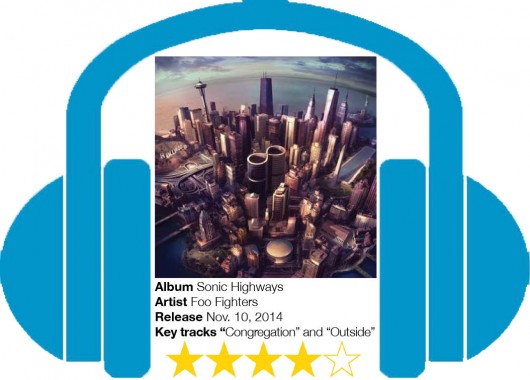
Click to enlarge.
It might not be cool to like the Foo Fighters, the kings of popular stadium “dad rock,” but I’m not a cool guy, so I’m the perfect one to defend the 20-year-old rock titans’ newest, most experimental and ambitious album, “Sonic Highways.”
Yes, it might be dad rock, but it’s dad rock done damn well, and I love my dad rock, damn it. This eclectic new album should make the Foos and the currently underappreciated genre of rock some new fans.
Big, brash and earnest stadium rock in the form of the Foo Fighters, U2 and several others has become unfairly polarizing in today’s world.
Critics and hipsters alike can easily dismiss this kind of rock by glibly referring to it as “dad rock.” On “Sonic Highways,” the Foo Fighters prove their worth with an album recorded in eight different cities important to American music (including Nashville, Tenn., New York and Los Angeles) and with a series of seminal guests, such as Joan Jett and Joe Walsh of Eagles fame. I should also note that while the album hasn’t earned universal acclaim, an accompanying HBO documentary miniseries showing its recording and the history of music in each city it was recorded in has.
The album’s not quite the band’s finest moment, but it stacks up as a solid rock album that does a fine job of saluting the diversity of American music and doing what the Foos do best: crafting tight, intense and lofty power-pop and punk rock melodies and hooks.
“Something From Nothing,” the album’s opening track featuring Cheap Trick lead guitarist Rick Nielsen, and “The Feast and the Famine” stack the deck early on with unceasing, yet inventive rockers. “Something” introduces funky clavicle to the band’s sound while “Feast” includes go-go drums (from Washington, D.C. funk roots), big organ and backing vocal flourishes.
The next song, “Congregation,” recorded in Nashville with popular country rocker Zac Brown, is one of the shining moments on the album. It features tight, hard-rocking guitar and a brilliant final bridge section with Brown, frontman and singer Dave Grohl, guitarist Pat Smear and lead guitar player Chris Shiflett trading riffs and solos.
“Outside” with Eagles lead guitarist Walsh is also an exceptional track. It’s another track that features the fantastic production of legendary producer Butch Vig (Nirvana, Smashing Pumpkins), who lets the musicians here breathe — you can hear the bass, drumming and multitude of guitars all clearly. Walsh’s guitar solo is just one of several things that click on the song.
“In The Clear” is classic Foo Fighters guitar rock, accompanied by a New Orleans brass band, while “Subterranean” is, with the help of Death Cab for Cutie frontman Ben Gibbard, a more meandering track that Grohl said was inspired by the final days of Nirvana. “I Am A River,” a tribute to New York, ends the album on some of the same notes that it started on — inspiring, affirming, yet with Grohl’s defiant rock ‘n’ roll flair writ large. And the combination of Grohl’s softer singing, strings and soaring melodies makes “River,” the album’s closer, sound fantastic.
Grohl’s approach to the songwriting for this album has inspired some controversy. He ad-libbed the lyrics based off of the interviews done for the TV series and his experiences in the city that each track was recorded in. But I think it works well enough. In particular, “The Feast and the Famine” includes an interesting nod to our nation’s capital — “Black heart with a gaping wound / Put back together by a troubled groove.” The lyrics really click if one has seen the show.
“Sonic Highways” might not be as strong as the Foo Fighters’ last album — the 2011 mega-hit “Wasting Light” — but it holds up well. It awakens the spirit, as only Grohl and company could, and it stands up as a visceral, catchy travelogue to the last, extraordinary century of American music. There’s no shame in rocking out. As I listen to this album, I know I am — and I think that the audience just might be as well, if they will give it a few spins.
![Ohio Gov. Mike DeWine signed Senate Bill 1 — a higher education overhaul bill — into law Friday. [Ohio Gov. Mike DeWine speaks at the State of the State address in Columbus. Credit: Joshua Gunter via TNS]](https://www.thelantern.com/files/2025/03/20250204-AMX-US-NEWS-DEWINE-BUDGET-INCREASES-TAXES-FOR-1-PLD-384x253.jpg)

